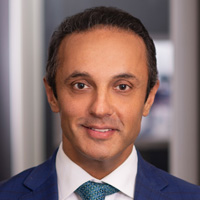Watch Out for Hidden Investing Fees and Commissions
An investment analysis can help ensure you're not losing money to unnecessary costs in your portfolio.

Profit and prosper with the best of Kiplinger's advice on investing, taxes, retirement, personal finance and much more. Delivered daily. Enter your email in the box and click Sign Me Up.
You are now subscribed
Your newsletter sign-up was successful
Want to add more newsletters?

Delivered daily
Kiplinger Today
Profit and prosper with the best of Kiplinger's advice on investing, taxes, retirement, personal finance and much more delivered daily. Smart money moves start here.

Sent five days a week
Kiplinger A Step Ahead
Get practical help to make better financial decisions in your everyday life, from spending to savings on top deals.

Delivered daily
Kiplinger Closing Bell
Get today's biggest financial and investing headlines delivered to your inbox every day the U.S. stock market is open.

Sent twice a week
Kiplinger Adviser Intel
Financial pros across the country share best practices and fresh tactics to preserve and grow your wealth.

Delivered weekly
Kiplinger Tax Tips
Trim your federal and state tax bills with practical tax-planning and tax-cutting strategies.

Sent twice a week
Kiplinger Retirement Tips
Your twice-a-week guide to planning and enjoying a financially secure and richly rewarding retirement

Sent bimonthly.
Kiplinger Adviser Angle
Insights for advisers, wealth managers and other financial professionals.

Sent twice a week
Kiplinger Investing Weekly
Your twice-a-week roundup of promising stocks, funds, companies and industries you should consider, ones you should avoid, and why.

Sent weekly for six weeks
Kiplinger Invest for Retirement
Your step-by-step six-part series on how to invest for retirement, from devising a successful strategy to exactly which investments to choose.
Right now, you're taking your hard-earned money and putting it into stocks, bonds, mutual funds or other investments with one purpose in mind: To make that cash grow for the future.
You're willing to do without this money, maybe scrimping for a while, hoping to dip into it when a child's college-tuition fees are due or when you're ready to retire and travel the world.
But if you're not careful, those investments can cost you more than you expected, possibly reaching into hundreds of thousands of dollars in potential earnings. It's a familiar caution: What you don't know can really hurt you.
From just $107.88 $24.99 for Kiplinger Personal Finance
Become a smarter, better informed investor. Subscribe from just $107.88 $24.99, plus get up to 4 Special Issues

Sign up for Kiplinger’s Free Newsletters
Profit and prosper with the best of expert advice on investing, taxes, retirement, personal finance and more - straight to your e-mail.
Profit and prosper with the best of expert advice - straight to your e-mail.
The U.S. Department of Labor estimates that investors as a group lose more than $17 billion each year through high fees and hidden costs. Congress passed legislation this year to try to rein in that number, making financial advisers and investment consultants more accountable for decisions they make on your behalf.
Hidden fees attached to investments are everywhere. Mutual funds, for example, can appear to be safe bets, but dividends can come minus commissions and expense ratios. Though they may seem minimal, if you know about them at all, they can add up to be a substantial cost over time.
How you buy them and who you buy them from can make a difference in the money you can save, and it may mean the difference between a month touring France and Italy and a week in a causeway motel.
We can't control the market, especially now with more volatility expected in the near future, but being able to control what you can should pay off in the long run.
Many people are unaware that the cost of their investments can exceed 1.5% a year. And, in my opinion, these costs are unnecessary in most cases. All they have to do is take a look at those internal costs and see what can be reduced or even eliminated. Many times, the costs are commissions, sometimes undisclosed, paid to brokers and advisers.
The new law, which takes full effect in 2018, says your financial advisers could face litigation if they can't prove their advice was in your best interest rather than their own. This definitely will clip some advisers' wings.
Either way, to me the best plan is this: Hire a financial adviser who is a fiduciary to analyze your investments and make recommendations on how to go about tweaking your nest egg so more money is coming in and less is going out in unnecessary, internal costs.
For most people contributing to retirement funds, all this investing stuff is incredibly difficult to understand, so most go to advisers, brokers and analysts for advice. But there are differences among those financial professionals, differences most people haven't a clue about.
A few years ago, TDAmeritrade conducted a survey that revealed some head-scratching statistics:
- 54% of those interviewed believed that all their brokers and investment consultants were acting in the clients' best interest, when in fact that wasn't the case. Brokers and certain other financial professionals are held to a suitability standard, meaning they aren't required to act in the best interest of the client, but rather are required to make recommendations that are suitable to the client's specific situation.
- 74% of respondents didn't understand the difference in the obligations of financial professionals acting under a suitability standard and those acting as fiduciaries. Fiduciaries are governed by a strict code of ethics and the law requires them to act in the best interest of their clients. They are required to report commissions, conflicts of interest and any fees charged.
- 79% of those surveyed just wanted to place the decision-making into someone else's hands.
Is that any way to watch over your money? Would you take your car into the shop and tell the mechanic to repair it no matter the cost? Would you buy furniture and leave your credit card to allow the store to charge you whatever it wanted?
While you can't control the political environment or ever-moving global financial forces, there are certain things you can control. Smart investors should constantly be looking at all the costs of investing, just to make sure they are under control.
That means understanding what you're giving up to get your fair share.
It's always good advice to have an investment analysis done, and it should be done by a fiduciary, one who is legally required to watch out for you and your money and take a seasoned look at the overall picture. A fiduciary will look at your lifestyle, and devise a strategy based on your goals and objectives. They must divulge all the internal costs of funds and work to eliminate what can be eliminated.
The actions you take now can make a big difference in how you live your retirement years down the road.
Reid Abedeen is a partner at Safeguard Investment Advisory Group LLC. As an investment adviser, he has helped retirees for more than 18 years with issues such as insurance, long-term care planning, financial services, asset protection and many other areas. He also holds California Life-Only and Accident and Health licenses (#0C78700).
Keith Morelli contributed to this article.
The appearances in Kiplinger were obtained through a PR program. The columnist received assistance from a public relations firm in preparing this piece for submission to Kiplinger.com. Kiplinger was not compensated in any way.
Profit and prosper with the best of Kiplinger's advice on investing, taxes, retirement, personal finance and much more. Delivered daily. Enter your email in the box and click Sign Me Up.

Reid Abedeen is the managing partner at Safeguard Investment Advisory Group, LLC. As an investment adviser, he has been helping retirees with insurance, long-term care planning, financial services, asset protection and other issues for more than 20 years. Abedeen has a degree in business administration. He holds California Life-Only and Accident and Health licenses and a Series 65 license, and he is registered through the Financial Industry Regulatory Authority.
-
 Dow Leads in Mixed Session on Amgen Earnings: Stock Market Today
Dow Leads in Mixed Session on Amgen Earnings: Stock Market TodayThe rest of Wall Street struggled as Advanced Micro Devices earnings caused a chip-stock sell-off.
-
 How to Watch the 2026 Winter Olympics Without Overpaying
How to Watch the 2026 Winter Olympics Without OverpayingHere’s how to stream the 2026 Winter Olympics live, including low-cost viewing options, Peacock access and ways to catch your favorite athletes and events from anywhere.
-
 Here’s How to Stream the Super Bowl for Less
Here’s How to Stream the Super Bowl for LessWe'll show you the least expensive ways to stream football's biggest event.
-
 How to Add a Pet Trust to Your Estate Plan: Don't Leave Your Best Friend to Chance
How to Add a Pet Trust to Your Estate Plan: Don't Leave Your Best Friend to ChanceAdding a pet trust to your estate plan can ensure your pets are properly looked after when you're no longer able to care for them. This is how to go about it.
-
 Want to Avoid Leaving Chaos in Your Wake? Don't Leave Behind an Outdated Estate Plan
Want to Avoid Leaving Chaos in Your Wake? Don't Leave Behind an Outdated Estate PlanAn outdated or incomplete estate plan could cause confusion for those handling your affairs at a difficult time. This guide highlights what to update and when.
-
 I'm a Financial Adviser: This Is Why I Became an Advocate for Fee-Only Financial Advice
I'm a Financial Adviser: This Is Why I Became an Advocate for Fee-Only Financial AdviceCan financial advisers who earn commissions on product sales give clients the best advice? For one professional, changing track was the clear choice.
-
 I Met With 100-Plus Advisers to Develop This Road Map for Adopting AI
I Met With 100-Plus Advisers to Develop This Road Map for Adopting AIFor financial advisers eager to embrace AI but unsure where to start, this road map will help you integrate the right tools and safeguards into your work.
-
 The Referral Revolution: How to Grow Your Business With Trust
The Referral Revolution: How to Grow Your Business With TrustYou can attract ideal clients by focusing on value and leveraging your current relationships to create a referral-based practice.
-
 This Is How You Can Land a Job You'll Love
This Is How You Can Land a Job You'll Love"Work How You Are Wired" leads job seekers on a journey of self-discovery that could help them snag the job of their dreams.
-
 65 or Older? Cut Your Tax Bill Before the Clock Runs Out
65 or Older? Cut Your Tax Bill Before the Clock Runs OutThanks to the OBBBA, you may be able to trim your tax bill by as much as $14,000. But you'll need to act soon, as not all of the provisions are permanent.
-
 The Key to a Successful Transition When Selling Your Business: Start the Process Sooner Than You Think You Need To
The Key to a Successful Transition When Selling Your Business: Start the Process Sooner Than You Think You Need ToWay before selling your business, you can align tax strategy, estate planning, family priorities and investment decisions to create flexibility.